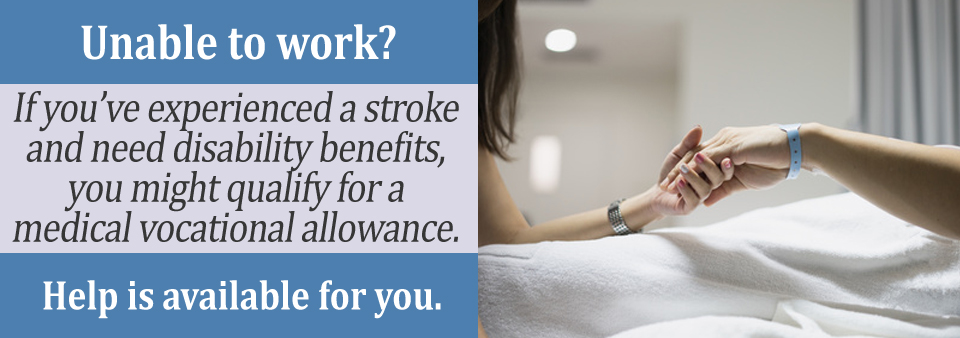Strokes are caused by brain hemorrhages or blocked blood vessels. Either can impact the blood flow to the brain and then lead to an injury. The effects and severity of a stroke can vary greatly, but some more common effects include vision problems, speech difficulty, problems with the comprehension or use of language, and difficulty walking or loss of mobility.
Most stroke victims experience muscle weakness in one form or another, and it usually affects one side of the body. It can cause numbness, a lack of sensations or chronic pain. While for some people it is just short-term damage, others can suffer the affects for the rest of their lives.
Getting Approved for Disability After a Stroke
Strokes are like any other disabling condition. You can be approved for disability benefits if you meet the criteria set forth in the Blue Book, which is the medical guide used by the Social Security Administration (SSA) to determine if someone is disabled. If you cannot meet the criteria of a listing in the Blue Book, you might be able to be approved for benefits using a medical-vocational allowance.
This kind of approval is made when it can be determined that you are not only unable to return to your past kind of work, but you cannot perform some other kind of work because of your functional limitations. This kind of approach takes several things into consideration while Disability Determination Services (DDS) is deciding if you are disabled.

Using an RFC For Your Stroke Claim
The SSA will create a residual functional capacity (RFC) to determine what you are still able to do after your stroke. DDS will go over your medical records to determine which impairments you suffered from your stroke. Lab reports, imaging studies, discharge summaries, physician notes, treatment records, and other supporting statements from your medical providers will be reviewed. Make sure your physician knows what you can and cannot do, such as climb stairs, lift items, button your shirt, type on a computer, how far you can walk, how long you can stand, if you are able to bend over frequently, and so forth. As all these things are reviewed, DDS is completing the RFC.
As an example, if your physician has noted that you cannot lift more than five pounds, have difficulty walking, are unable to stand long periods, cannot climb stairs, and have difficulty with communication, all these things will be used to determine what kind of work you can do, if any. As an example, if you are right-handed and your right arm was weakened by the stroke, you cannot grasp or lift items with the right hand, type or input data, or you cannot do tasks that require coordination, it will be determined you cannot do many jobs, including desk jobs.
Consult With a Disability Attorney
If a stroke has left you unable to work, a disability attorney can help you determine if you could be approved for benefits using the medical-vocational allowance. Speak with an attorney in your area by filling out our Free Disability Evaluation.